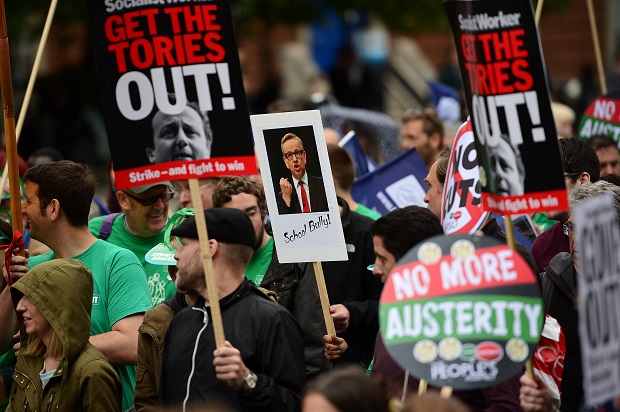David Cameron has promised to change the law to make it harder to go on strike if he wins the next election. The Spectator has generally been in favour of tightening up strike laws, not trusting union leaders to do the right thing. In 1919, just as a law banning the police from striking was being passed, The National Police Union issued a sudden order to down tools, which was not a good PR move.
‘This unscrupulous attempt failed except in Liverpool and Birkenhead, where about half the police absented themselves from duty and allowed the criminal classes, who are largely Irish Roman Catholics, to riot and plunder. Order was restored last Sunday by troops. In London about a thousand men out of 19,000 failed to appear at their posts. Sir Nevil Macready was prepared for such an emergency, and a mild outbreak of disorder south of the river was promptly suppressed. In Birmingham a tenth of the police ceased work. All the other police forces remained loyal…An ugly feature of the police “strike” was the secrecy with which it had been planned by the Union organizers for the eve of the holidays. These men suddenly issued an order to their deluded followers to cease work at once. Had the order been obeyed, the great cities would all have been exposed to the fate of Liverpool, where for several days the mob had command of the central shopping district, and looted and destroyed property to the value of £200,000 before it was dispersed by rifle-fire. The organizers must have foreseen the possible results of their action.’
A year later, the Conservative government brought in a bill to make union ballots secret. The Spectator was in favour of reform, describing how wild young men were running amok and ‘prostituting trade unionism and Democracy’.
‘On the vital issue of a big strike the vote should be as free and secret as the Parliamentary vote. No ballot should be valid without a clear majority vote. And above all, in politics and in trade unionism, the vote should be one of intelligence and not ignorance. If we are ill we seek a skilled medical man. If we want a machine we seek a skilled engineer. If we want a house we seek a skilled architect. But when we want to settle huge and vital industrial, social, and political questions we appeal to the mob, especially to the ignorant section of the mob. Let us enfranchise intelligence, and then, but not till then, shall we be on the road to real progress and happiness. A wide and comprehensive franchise means rule by ignorance. The open trade union ballot means rule by intimidation. The “faked” vote means rule by trickery.’
After some early strike success in the early 1980s, the National Union of Mineworkers voted three times against Arthur Scargill’s motion to strike again. They were right and Scargill was, according to The Spectator at the time, ‘a paper tiger and a flesh-and-blood buffoon’.
‘The Government and the country gain immeasurably from the miners’ demonstration of their commonsense. The miners have called their own bluff, and shown their president Mr Scargill to be a poker player fit only for the kindergarten. We are all most obliged, and especially to Mr Scargill for being so silly as to go for broke with a busted flush.’
This week Cameron said he did not think public services should ever be disrupted. When he’s taking on unions for teachers, firemen and civil servants, he might perhaps like to use this argument from The Spectator in 1919:
‘The policeman’s calling is not a trade, any more than the soldier’s or sailor’s calling. The policeman’s task is to protect the community against criminals. Therefore the police must be controlled by the community. If they were controlled by any private persons like the Police Union Executive, those persons would be our masters and we should cease to be a democracy.’






Comments